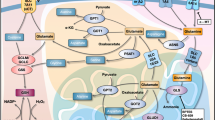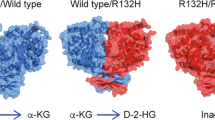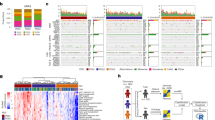Abstract
Molecular targeting is an import strategy to treat advanced colon cancer. The current study demonstrates that expression of GRM3, a metabotropic glutamate receptor mainly expressed in mammalian central nervous system, is significantly upregulated in majority of human colonic adenocarcinomas tested and colon cancer cell lines. Knockdown of GRM3 expression or inhibition of GRM3 activation in colon cancer cells reduces cell survival and anchorage-independent growth in vitro and inhibits tumor growth in vivo. Mechanistically, GRM3 antagonizes TGFβ-mediated activation of protein kinase A and inhibition of Protein kinase B (AKT). In addition, TGFβ signaling increases GRM3 protein stability and knockdown of GRM3 enhances TGFβ-mediated tumor suppressor function. Further studies indicate that miR-487b-3p directly targets GRM3. Overexpression of miR-487b-3p mimics the effects of GRM3 knockdown and suppresses the tumorigenicity of colon cancer cells in vivo. Expression of miR-487b-3p is decreased in colon adenocarcinomas and inversely correlates with GRM3 expression. Taken together, these studies indicate that upregulation of GRM3 expression is a functionally important molecular event in colon cancer, and that GRM3 is a promising molecular target for colon cancer treatment. This is particularly interesting and important from a therapeutic standpoint because numerous metabotropic glutamate receptor antagonists are available, many of which have been found unsuitable for treatment of neuropsychiatric disorders for reasons such as inability to readily penetrate blood brain barriers. As GRM3 is upregulated in colon cancer, but rarely expressed in normal peripheral tissues, targeting GRM3 with such agents would not likely cause adverse neurological or peripheral side effects, making GRM3 an attractive and specific molecular target for colon cancer treatment.
This is a preview of subscription content, access via your institution
Access options
Subscribe to this journal
Receive 50 print issues and online access
$259.00 per year
only $5.18 per issue
Buy this article
- Purchase on Springer Link
- Instant access to full article PDF
Prices may be subject to local taxes which are calculated during checkout









Similar content being viewed by others
References
Curtis DR, Phillis JW, Watkins JC . Chemical excitation of spinal neurones. Nature 1959; 183: 611–612.
Hayashi T . A physiological study of epileptic seizures following cortical stimulation in animals and its application to human clinics. Jpn J Physiol 1952; 3: 46–64.
Tanabe Y, Masu M, Ishii T, Shigemoto R, Nakanishi S . A family of metabotropic glutamate receptors. Neuron 1992; 8: 169–179.
Aramori I, Nakanishi S . Signal transduction and pharmacological characteristics of a metabotropic glutamate receptor, mGluR1, in transfected CHO cells. Neuron 1992; 8: 757–765.
Skerry TM . Genever PG. Glutamate signalling in non-neuronal tissues. Trends Pharmacol Sci 2001; 22: 174–181.
Hoogduijn MJ, Hitchcock IS, Smit NP, Gillbro JM, Schallreuter KU, Genever PG . Glutamate receptors on human melanocytes regulate the expression of MiTF. Pigment Cell Res 2006; 19: 58–67.
Tong Q, Ouedraogo R, Kirchgessner AL . Localization and function of group III metabotropic glutamate receptors in rat pancreatic islets. Am J Physiol Endocrinol Metab 2002; 282: E1324–E1333.
Chang HJ, Yoo BC, Lim SB, Jeong SY, Kim WH, Park JG . Metabotropic glutamate receptor 4 expression in colorectal carcinoma and its prognostic significance. Clin Cancer Res 2005; 11: 3288–3295.
Martino JJ, Wall BA, Mastrantoni E, Wilimczyk BJ, La Cava SN, Degenhardt K et al. Metabotropic glutamate receptor 1 (Grm1) is an oncogene in epithelial cells. Oncogene 2013; 32: 4366–4376.
Kim MS, Chang X, Nagpal JK, Yamashita K, Baek JH, Dasgupta S et al. The N-methyl-d-aspartate receptor type 2A is frequently methylated in human colorectal carcinoma and suppresses cell growth. Oncogene 2008; 27: 2045–2054.
Prickett TD, Wei X, Cardenas-Navia I, Teer JK, Lin JC, Walia V et al. Exon capture analysis of G protein-coupled receptors identifies activating mutations in GRM3 in melanoma. Nat Genet 2011; 43: 1119–1126.
Ciceroni C, Arcella A, Mosillo P, Battaglia G, Mastrantoni E, Oliva MA et al. Type-3 metabotropic glutamate receptors negatively modulate bone morphogenetic protein receptor signaling and support the tumourigenic potential of glioma-initiating cells. Neuropharmacology 2008; 55: 568–576.
Arcella A, Carpinelli G, Battaglia G, D'Onofrio M, Santoro F, Ngomba RT et al. Pharmacological blockade of group II metabotropic glutamate receptors reduces the growth of glioma cells in vivo. Neuro Oncol 2005; 7: 236–245.
D'Onofrio M, Arcella A, Bruno V, Ngomba RT, Battaglia G, Lombari V et al. Pharmacological blockade of mGlu2/3 metabotropic glutamate receptors reduces cell proliferation in cultured human glioma cells. J Neurochem 2003; 84: 1288–1295.
Zhou K, Song Y, Zhou W, Zhang C, Shu H, Yang H et al. mGlu3 receptor blockade inhibits proliferation and promotes astrocytic phenotype in glioma stem cells. Cell Biol Int 2014; 38: 426–434.
Wakefield LM, Roberts AB . TGF-beta signaling: positive and negative effects on tumorigenesis. Curr Opin Genet Dev 2002; 12: 22–29.
Bu P, Wang L, Chen KY, Rakhilin N, Sun J, Closa A et al. miR-1269 promotes metastasis and forms a positive feedback loop with TGF-beta. Nat Commun 2015; 6: 6879.
Calon A, Espinet E, Palomo-Ponce S, Tauriello DV, Iglesias M, Cespedes MV et al. Dependency of colorectal cancer on a TGF-beta-driven program in stromal cells for metastasis initiation. Cancer Cell 2012; 22: 571–584.
Gulubova M, Manolova I, Ananiev J, Julianov A, Yovchev Y, Peeva K . Role of TGF-beta1, its receptor TGFbetaRII, and Smad proteins in the progression of colorectal cancer. Int J Colorectal Dis 2010; 25: 591–599.
Wang J, Yang L, Yang J, Kuropatwinski K, Wang W, Liu XQ et al. Transforming growth factor beta induces apoptosis through repressing the phosphoinositide 3-kinase/AKT/survivin pathway in colon cancer cells. Cancer Res 2008; 68: 3152–3160.
Wang J, Sun L, Myeroff L, Wang X, Gentry LE, Yang J et al. Demonstration that mutation of the type II transforming growth factor beta receptor inactivates its tumor suppressor activity in replication error-positive colon carcinoma cells. J Biol Chem 1995; 270: 22044–22049.
Wang J, Han W, Zborowska E, Liang J, Wang X, Willson JK et al. Reduced expression of transforming growth factor beta type I receptor contributes to the malignancy of human colon carcinoma cells. J Biol Chem 1996; 271: 17366–17371.
Chowdhury S, Howell GM, Rajput A, Teggart CA, Brattain LE, Weber HR et al. Identification of a novel TGFbeta/PKA signaling transduceome in mediating control of cell survival and metastasis in colon cancer. PLoS One 2011; 6: e19335.
Simms N, Rajput A, Sharratt EA, Ongchin M, Teggart CA, Wang J et al. Transforming growth factor-ss suppresses metastasis in a subset of human colon carcinoma cells. BMC Cancer 2012; 12: 221.
Forrester E, Chytil A, Bierie B, Aakre M, Gorska AE, Sharif-Afshar AR et al. Effect of conditional knockout of the type II TGF-beta receptor gene in mammary epithelia on mammary gland development and polyomavirus middle T antigen induced tumor formation and metastasis. Cancer Res 2005; 65: 2296–2302.
Yang L, Huang J, Ren X, Gorska AE, Chytil A, Aakre M et al. Abrogation of TGF beta signaling in mammary carcinomas recruits Gr-1+CD11b+ myeloid cells that promote metastasis. Cancer Cell 2008; 13: 23–35.
Veenendaal LM, Kranenburg O, Smakman N, Klomp A, Borel RI, van Diest PJ . Differential Notch and TGFbeta signaling in primary colorectal tumors and their corresponding metastases. Cell Oncol 2008; 30: 1–11.
Bacman D, Merkel S, Croner R, Papadopoulos T, Brueckl W, Dimmler A . TGF-beta receptor 2 downregulation in tumour-associated stroma worsens prognosis and high-grade tumours show more tumour-associated macrophages and lower TGF-beta1 expression in colon carcinoma: a retrospective study. BMC Cancer 2007; 7: 156.
Hamamoto T, Beppu H, Okada H, Kawabata M, Kitamura T, Miyazono K et al. Compound disruption of smad2 accelerates malignant progression of intestinal tumors in apc knockout mice. Cancer Res 2002; 622: 5955–5961.
Munoz NM, Upton M, Rojas A, Washington MK, Lin L, Chytil A et al. Transforming growth factor beta receptor type II inactivation induces the malignant transformation of intestinal neoplasms initiated by Apc mutation. Cancer Res 2006; 66: 9837–9844.
Sodir NM, Chen X, Park R, Nickel AE, Conti PS, Moats R et al. Smad3 deficiency promotes tumorigenesis in the distal colon of ApcMin/+ mice. Cancer Res 2006; 66: 8430–8438.
Takaku K, Oshima M, Miyoshi H, Matsui M, Seldin MF, Taketo MM . Intestinal tumorigenesis in compound mutant mice of both Dpc4 (Smad4) and Apc genes. Cell 1998; 92: 645–656.
Zeng Q, Phukan S, Xu Y, Sadim M, Rosman DS, Pennison M et al. Tgfbr1 haploinsufficiency is a potent modifier of colorectal cancer development. Cancer Res 2009; 69: 678–686.
Du T, Zamore PD . microPrimer: the biogenesis and function of microRNA. Development 2005; 132: 4645–4652.
Bartel DP . MicroRNAs: target recognition and regulatory functions. Cell 2009; 136: 215–233.
Zhang B, Pan X, Cobb GP, Anderson TA . microRNAs as oncogenes and tumor suppressors. Dev Biol 2007; 302: 1–12.
Schoepp DD, Jane DE, Monn JA . Pharmacological agents acting at subtypes of metabotropic glutamate receptors. Neuropharmacology 1999; 38: 1431–1476.
Roig AI, Eskiocak U, Hight SK, Kim SB, Delgado O, Souza RF et al. Immortalized epithelial cells derived from human colon biopsies express stem cell markers and differentiate in vitro. Gastroenterology 2010; 138: 1012–1021.
Markowitz S, Wang J, Myeroff L, Parsons R, Sun L, Lutterbaugh J et al. Inactivation of the type II TGF-beta receptor in colon cancer cells with microsatellite instability. Science 1995; 268: 1336–1338.
Chowdhury S, Ongchin M, Sharratt E, Dominguez I, Wang J, Brattain MG et al. Intra-tumoral heterogeneity in metastatic potential and survival signaling between iso-clonal HCT116 and HCT116b human colon carcinoma cell lines. PLoS One 2013; 8: e60299.
Ye SC, Foster JM, Li W, Liang J, Zborowska E, Venkateswarlu S et al. Contextual effects of transforming growth factor beta on the tumorigenicity of human colon carcinoma cells. Cancer Res 1999; 59: 4725–4731.
Woodford-Richens KL, Rowan AJ, Gorman P, Halford S, Bicknell DC, Wasan HS et al. SMAD4 mutations in colorectal cancer probably occur before chromosomal instability, but after divergence of the microsatellite instability pathway. Proc Natl Acad Sci USA 2001; 98: 9719–9723.
da Costa LT, He TC, Yu J, Sparks AB, Morin PJ, Polyak K et al. CDX2 is mutated in a colorectal cancer with normal APC/beta-catenin signaling. Oncogene 1999; 18: 5010–5014.
Kingston AE, Ornstein PL, Wright RA, Johnson BG, Mayne NG, Burnett JP et al. LY341495 is a nanomolar potent and selective antagonist of group II metabotropic glutamate receptors. Neuropharmacology 1998; 37: 1–12.
Banerjee A, Pirrone V, Wigdahl B, Nonnemacher MR . Transcriptional regulation of the chemokine co-receptor CCR5 by the cAMP/PKA/CREB pathway. Biomed Pharmacother 2011; 65: 293–297.
Geng L, Chaudhuri A, Talmon G, Wisecarver JL, Wang J . TGF-Beta suppresses VEGFA-mediated angiogenesis in colon cancer metastasis. PLoS One 2013; 8: e59918.
Grimson A, Farh KK, Johnston WK, Garrett-Engele P, Lim LP, Bartel DP . MicroRNA targeting specificity in mammals: determinants beyond seed pairing. Mol Cell 2007; 27: 91–105.
Krek A, Grun D, Poy MN, Wolf R, Rosenberg L, Epstein EJ et al. Combinatorial microRNA target predictions. Nat Genet 2005; 37: 495–500.
Betel D, Koppal A, Agius P, Sander C, Leslie C . Comprehensive modeling of microRNA targets predicts functional non-conserved and non-canonical sites. Genome Biol 2010; 11: R90.
Cha JH, Kosinski CM, Kerner JA, Alsdorf SA, Mangiarini L, Davies SW et al. Altered brain neurotransmitter receptors in transgenic mice expressing a portion of an abnormal human huntington disease gene. Proc Natl Acad Sci USA 1998; 95: 6480–6485.
Lourenco NF, Schadrack J, Platzer S, Zieglgansberger W, Tolle TR, Castro-Lopes JM . Expression of metabotropic glutamate receptors mRNA in the thalamus and brainstem of monoarthritic rats. Brain Res Mol Brain Res 2000; 81: 140–154.
Minoshima T, Nakanishi S . Structural organization of the mouse metabotropic glutamate receptor subtype 3 gene and its regulation by growth factors in cultured cortical astrocytes. J Biochem 1999; 126: 889–896.
Neto FL, Schadrack J, Platzer S, Zieglgansberger W, Tolle TR, Castro-Lopes JM . Up-regulation of metabotropic glutamate receptor 3 mRNA expression in the cerebral cortex of monoarthritic rats. J Neurosci Res 2001; 63: 356–367.
Boyd DD, Levine AE, Brattain DE, McKnight MK, Brattain MG . Comparison of growth requirements of two human intratumoral colon carcinoma cell lines in monolayer and soft agarose. Cancer Res 1988; 48: 2469–2474.
Zhang Y, Geng L, Talmon G, Wang J . MicroRNA-520g confers drug resistance by regulating p21 expression in colorectal cancer. J Biol Chem 2015; 290: 6215–6225.
Zhang Y, Talmon G, Wang J . MicroRNA-587 antagonizes 5-FU-induced apoptosis and confers drug resistance by regulating PPP2R1B expression in colorectal cancer. Cell Death Dis 2015; 6: e1845.
Geng L, Chaudhuri A, Talmon G, Wisecarver JL, Are C, Brattain M et al. MicroRNA-192 suppresses liver metastasis of colon cancer. Oncogene 2014; 33: 5332–5340.
Acknowledgements
This work was supported by NIH/NCI R01CA140988-01 to JW. HY was partially supported by Chinese Scholar Council.
Author information
Authors and Affiliations
Corresponding author
Ethics declarations
Competing interests
The authors declare no conflict of interest.
Additional information
Supplementary Information accompanies this paper on the Oncogene website
Supplementary information
Rights and permissions
About this article
Cite this article
Yi, H., Geng, L., Black, A. et al. The miR-487b-3p/GRM3/TGFβ signaling axis is an important regulator of colon cancer tumorigenesis. Oncogene 36, 3477–3489 (2017). https://doi.org/10.1038/onc.2016.499
Received:
Revised:
Accepted:
Published:
Issue Date:
DOI: https://doi.org/10.1038/onc.2016.499
This article is cited by
-
The Diagnostic and Prognostic Value of Neurotransmitter Receptor-Related Genes in Colon Adenocarcinoma
Molecular Biotechnology (2023)
-
Modulatory role of tea in arsenic induced epigenetic alterations in carcinogenesis
The Nucleus (2021)
-
Circ_0079593 facilitates proliferation, metastasis, glucose metabolism and inhibits apoptosis in melanoma by regulating the miR-516b/GRM3 axis
Molecular and Cellular Biochemistry (2020)



